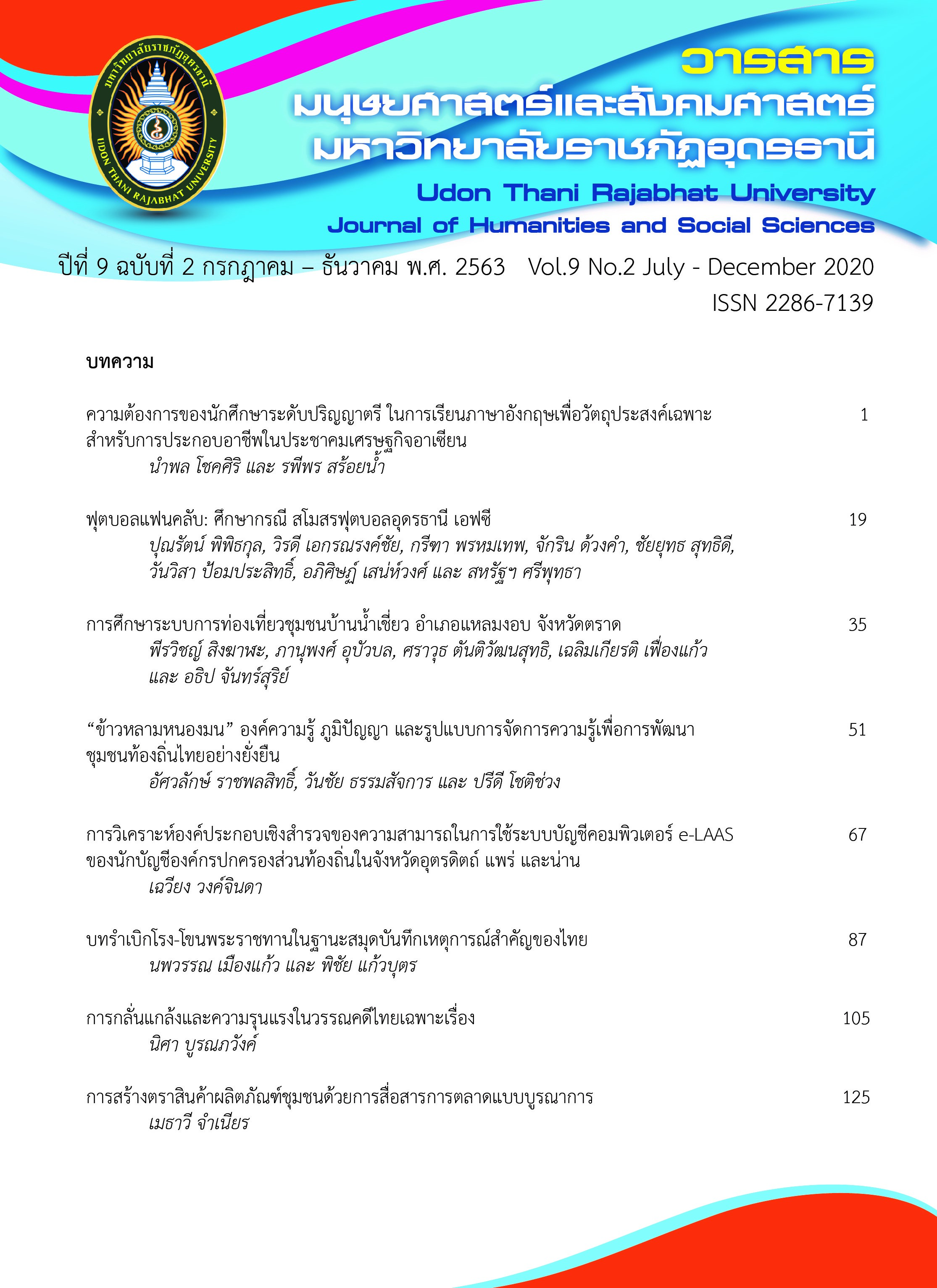ความต้องการของนักศึกษาระดับปริญญาตรี ในการเรียนภาษาอังกฤษ เพื่อวัตถุประสงค์เฉพาะ สำหรับการประกอบอาชีพในประชาคม เศรษฐกิจอาเซียน
Main Article Content
บทคัดย่อ
การวิจัยครั้งนี้มีวัตถุประสงค์เพื่อศึกษาความยากและความต้องการในการเรียนทักษะภาษาอังกฤษของนักศึกษาปริญญาตรี ในระดับมหาวิทยาลัย จำแนกตามกลุ่มคณะ ได้แก่ กลุ่มคณะวิทยาศาสตร์สุขภาพ กลุ่มคณะวิทยาศาสตร์และเทคโนโลยี และกลุ่มคณะสังคมศาสตร์ จำนวน 369 คน โดยใช้การสุ่มกลุ่มตัวอย่างแบบหลายขั้นตอน และสัมภาษณ์นักศึกษาจำนวน 12 โดยการเลือกแบบเจาะจง การเก็บรวบรวมข้อมูลโดยใช้ แบบสอบถามแสดงความคิดเห็นต่อความยากและความต้องการในการเรียนทักษะภาษาอังกฤษ (α = 0.97) และแบบสัมภาษณ์กึ่งโครงสร้าง ผลการวิจัยพบว่า ความยากในการเรียนไวยากรณ์อยู่ในระดับมาก ส่วนความยากในการเรียนทักษะด้านการฟัง การเขียน คำศัพท์ และการอ่านอยู่ในระดับปานกลาง และความต้องการของนักศึกษา พบว่าทุกทักษะมีระดับความต้องการมากที่สุด โดยการฟังเป็นอันดับหนึ่ง ตามด้วยการพูด คำศัพท์ การอ่าน การเขียนและไวยากรณ์ ผลจากการศึกษาด้วยสถิติ One-way ANOVA และทำการเปรียบเทียบเชิงซ้อนโดยใช้ Scheffé พบว่านักศึกษาในกลุ่มวิทยาศาสตร์และเทคโนโลยีมีระดับความยากในการเรียนไวยากรณ์ คำศัพท์และการอ่านแตกต่างกันอย่างมีนัยสำคัญทางสถิติที่ระดับนัยสำคัญ 0.05 ส่วนความต้องการในการเรียนทักษะภาษาอังกฤษ พบว่านักศึกษาทั้ง 3 กลุ่มมีความต้องการในการเรียนภาษาอังกฤษทุกทักษะมากที่สุดและไม่แตกต่างกัน ข้อมูลจากการสัมภาษณ์เชิงลึกเพิ่มเติม พบว่าการเรียนและการพัฒนาทักษะภาษาอังกฤษผ่านการทำกิจกรรมที่เน้นให้ผู้เรียนได้ใช้ทักษะภาษาจริงมีความสำคัญอย่างยิ่งต่อความสำเร็จในการเรียนเพื่อนำไปใช้ในการประกอบอาชีพในประชาคมเศรษฐกิจอาเซียนได้
Article Details
เอกสารอ้างอิง
Broughton, G., Brumfit, C., Flavell, R., Hill, P., & Pincas, A. (2003). Teaching English as a foreign language. UK: Routledge, Taylor and Francis e-Library.
Chatsungnoen, P. (2015). Needs Analysis for an English for Specific Purposes (ESP) Course for Thai Undergraduates in a Food Science and Technology Programme. Ph.D. Dissertation in Education, Massey University, Palmerston North, New Zealand.
Chaweerat, P. (2016). KKU holds introduction for students before their Internships in ASEAN. Retrieved September 12, 2018, from https://m.kku. ac.th/news/content.php?did=N0012667&l=en.
Coll, R. K., Pinyonatthagarn, D., & Pramoolsook, I. (2003). The internationalization of cooperative education: A Thailand perspective. Asia Pacific Journal of Cooperative Education, 4(2), 1- 6.
Dudley-Evans, T., & St. John, M. J. (1998). Developments in English for specific purposes. Cambridge: Cambridge University Press.
Hutchinson, T., & Waters, A. (1987). English for specific purposes: A learning centered approach. Cambridge: Cambridge University Press.
Johns, A. M. (2013). The history of English for specific purposes research. In B. Paltridge & S. Starfield (Eds.), The handbook of English for specific purposes. UK: Wiley-Blackwell.
Jordan, R.R. (1997). English for academic purposes: a guide and resource book for teachers. Cambridge: Cambridge University Press.
Kaewpet, C. (2012). The Needs for Professional English of Thai Engineering Students: Necessities, Lacks and Wants. Paper presented at RIT Forum, Faculty of Liberal Arts, Rajamangala Institute of Technology, Phathumthani, Thailand.
Kitjaroonchai, N. (2013). Motivation toward English language learning of students in secondary and high schools in education service. Area Office 4, Saraburi Province, Thailand. International Journal of Language and Linguistics, 1(1), 22-33.
Lazaro, D., & Medalla, E. (2004). English as the Language of Trade, Finance and Technology in APEC: An East Asia Perspective. Philippine Journal of Development, 2(31), 1-18.
Lohapan, N. (2015). The Readiness to ASEAN Economics Community of Accounting Students from Khon Kaen University Nong Khai Campus. Srinakharinwirot Business Journal (SBJ), 6(1), 1-11.
Ministry of Education. (2012). The basic education core curriculum B.E. 2551 (A.D. 2008). Bangkok: The Agricultural Co-operative Federation of Thailand.
Noom-ura, S. (2013). English-Teaching Problems in Thailand and Thai Teachers' Professional Development Needs. English Language Teaching, 6(11), 139-147.
Pakir, A. (2010). Current research on Englishes in Southeast Asia. World Englishes, 29(3), 329-335.
Rainsbury, E., Hodges, D., Burchell, N. & Lay, M. C. (2002). Ranking workplace competencies: Student and graduate perceptions. Asia-Pacific Journal of Cooperative Education, 3(2), 8-18.
Techapun, S. (2014) Needs analysis of English for biomedical engineering students: a case study of Thai undergraduate students. Master Thesis of Arts (Language and Culture for Communication and Development), Faculty of graduate studies, Mahidol University.
West, R. (1997). Needs analysis in language teaching. Language Teaching, 27(1), 1-19.


